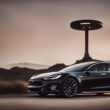2015 was a difficult year for the automotive industry and it is far from clear whether 2016 will be a better one. We spoke to VDA President Matthias Wissmann about the challenges of the past and next year.
In conversation: Matthias Wissmann, President of the German Association of the Automotive Industry (VDA)
"We need a starting impulse for electric vehicles"
The VW scandal overshadows the auto year 2015, but also some weakening markets and political uncertainties are weighing on business. And especially in Germany, electromobility simply doesn't get going. How does the German Association of the Automotive Industry (VDA), as a representative of 600 member companies, look back on the year 2015 and what can we expect from 2016?

Terrorism, refugee flows, VW scandal, weak BRIC countries, China with reduced growth. Which crisis worried you the most in the past year?
Indeed, we can look back on a turbulent year with many challenges.
Although some markets performed poorly, overall the global passenger car market also grew 2015: Western Europe, China and the USA are up. And of course we were very concerned when the news about VW and Diesel reached us during the IAA. We are absolutely convinced of the engineering achievements in our 600 member companies. It is disconcerting when a major company like VW has been manipulated in terms of pollutant emissions.
After the VW scandal, the critical voices about the diesel engine are piling up. Can it still be a real answer to the mobility of tomorrow, given the necessary efforts to clean the exhaust gas?
The anti-diesel lobby is currently noisy. Attempts are made again and again to put diesel - or even the entire automotive industry - under general suspicion. We defend ourselves against this with facts and arguments. It would be completely unjustified, because of a process in a company, to question all diesel technology, in which the Germans are known to be world leaders. The modern Euro 6 diesel achieves top values for the reduction of pollutants with the latest exhaust gas treatment technologies. And above all, it is more efficient than the gasoline engine. That's what makes him so popular.
It is an indispensable helper to successfully master the two major ecological tasks: the reduction of pollutants on the one hand and the reduction of CO2 emissions on the other. Every second car that is newly registered in Western Europe is a diesel. And every second diesel sold in Western Europe has a German trademark. Modern diesel technology is proof of German engineering. Euro-6 diesels are not only cleaner and more economical on the road, but also on the street. Like electromobility, diesel is a future technology with great importance for value creation and employment in Germany.
Has the auto industry, in the competition for the last tenth of consumption reduction, stretched the limits of the legal standard too far to produce practical values?
Again: It's about manipulation in a company, not in the entire industry! Software tricks and fake emission data contradict the self-image of the industry. In the course of the events, the other manufacturers have clearly stated that there is no software manipulation in the form of so-called “defeat devices”. The distinction is important: Illegal manipulations of exhaust gas values are different from regular, technical differences between laboratory measurements and emissions in road traffic. Those who want to put the diesel and the German automotive industry under general suspicion keep trying to lump laboratory and street values.
The number of electric cars in Germany remains at a low level. Of course, the range is significantly less than a car with a combustion engine and the prices are higher. But can these be the only reasons?
The German automotive industry wants to decisively promote electromobility - not least to meet the CO2 limit values. The supply of electric cars in Germany is steadily increasing. At the beginning of 2016, 29 different models from German manufacturers alone will be on the road. However, the framework conditions are not yet optimal - that is what still bothers many customers. The growth rates in the market for electric cars are much higher in other countries, for example in Norway or the Netherlands. They show that people are enthusiastic about electromobility - if the framework conditions are right. That is why the VDA is committed to ensuring that politicians set new impulses - in procurement as well as in the charging infrastructure.
Most manufacturers now have first e-car generations in the market. It will take some time before further real innovations come. Will not this cloud demand? How do the manufacturers want to counteract this?
The electric models of German manufacturers are well received by customers around the world. Between January and September this year we increased our market share in the electric car segment in Western Europe from 27 to 43 percent. With 59 percent and 55 percent share, respectively, we are market leaders in the two important Western European markets for electric vehicles, the Netherlands and Norway. We are also doing very well in the USA, the world's largest market for electric vehicles. Every fifth electric car sold in the USA today comes from German manufacturers. In our home market of Germany, we have a 55 percent market share. The industry is doing everything it can to make electric mobility a breakthrough. However, the international comparison shows that in countries that provide electromobility with state aid, the number of registrations is rising sharply. Only in Germany is the market not really getting going. We now need a starting impulse that is limited to just a few years to boost demand.
Global car sales rose despite all crises in 2015. How will 2016 be, especially for German manufacturers? Do you see any particular risks for Volkswagen?
These are troubled times; Political tensions are growing in the Middle East, and the fight against terror is a challenge for industrialized countries. But at the same time the oil price is lower than it has been for a long time, employment in Germany is high, and so is purchasing power. If the framework conditions do not change, we expect the global passenger car market to grow by 2016 percent to 2 million units in 78,1. And the three major automotive markets - Western Europe, USA and China - will continue to grow next year. But the way is getting rockier. The German car market will grow slightly to around 2016 million new registrations in 3,2. We expect exports to grow by 1 percent to just under 4,5 million cars. Domestic production is also likely to increase by 1 percent to around 5,8 million units. We expect stable development in sales and employment. Regarding Volkswagen: We very much welcome the fact that, under the new management, Volkswagen is resolving the events with determination and maximum transparency. This is the right way to regain customer trust.
The conversation was led by SP-X editor Günter Weigel




